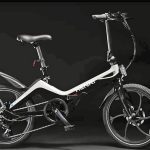Angela Merkel will become the first German chancellor to attend Eurobike when she visits the trade show Aug. 28, according to the European Cyclsts’ Federation (ECF).
“Mrs Merkel’s visit gives the topic of cycling a stronger political dimension”, says Klaus Wellman, CEO of Eurobike host Messe Friedrichshafen. Even more so as Merkel takes the time to get up-to-date about cycling in the middle of the German election campaign.
Merkel’s visit to Europe’s largest bicycle trade show comes amidst robust sales of e-bikes in Germany. Europe’s bike industry annually sells worth €50 billion of bikes and is expected to grow significantly in the years ahead.
“Angela Merkel’s visit to Eurobike proves that a world leader concerned about the future of transport wouldn’t visit just car factories anymore,” says Manfred Neun, president of the ECF. “Nowadays, you go to a bike show. Seventy-five percent of Germans are cycling more or less regularly as a politician, you just can’t ignore this immense group of voters any longer.”
At ECF’s Advocacy Summit, ECF and its Cycling Industry Club (CIC) will present research estimating that cycling’s combined benefits are worth more than €150 billion to the European economy alone. In addition, studies suggest that more cycling trips could save up to €84 billion in health expenses in the US and EU combined.
“Our goal is to push the EU to free up €6 billion of funding for cycling over the next 5 years,” explains ECF president Manfred Neun. “Recently, a consortium of the world’s biggest multilateral development banks has pledged $175 billion (€130 billion) for sustainable transport. Now these huge investments have to be followed by political action.”
With Angela Merkel attending Eurobike, cycling indeed gets the attention it deserves at the highest political level. A message that other world leaders can hardly ignore.
With over 70 members across 40 countries, the ECF unites cyclist’ associations from across the globe, giving them a voice on the international level. Our aim is to get more people cycling more often by influencing policy in favour of cycling. ECF’s members are complemented by networks Scientists for Cycling, Cities for Cycling and the ECF Cycling Industry Club.













